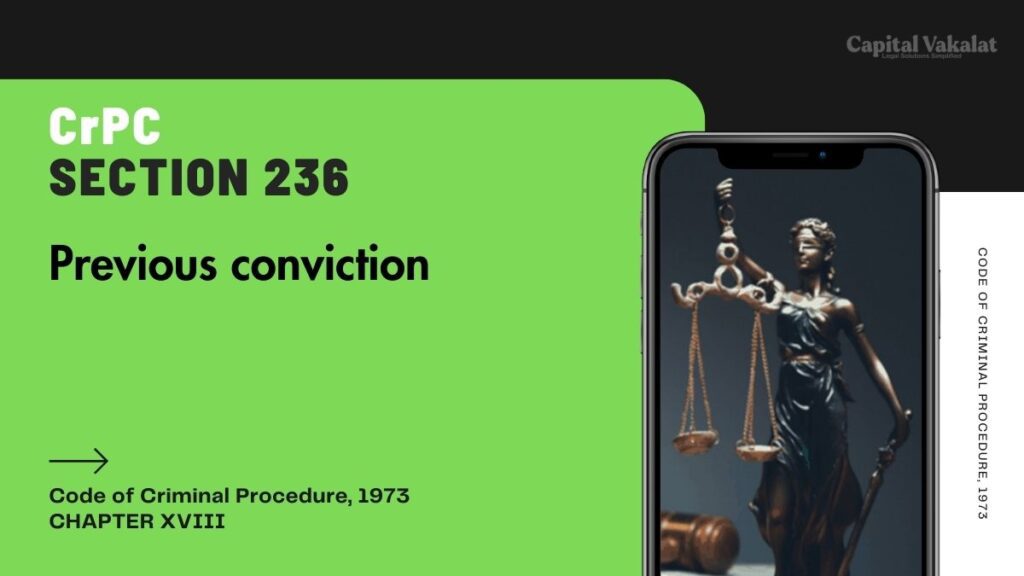Section 236 of the Criminal Procedure Code (CrPC) is a crucial aspect of the Indian legal system, directly impacting how previous convictions are considered during sentencing in criminal cases. This section serves as a pivotal element in ensuring that justice is meted out fairly, taking into account the defendant’s criminal history.

In this comprehensive analysis, we delve into the various facets of Section 236 CrPC, exploring its nuances, legal interpretations, and real-world implications.
Understanding Section 236 CrPC
Section 236 of the CrPC outlines the procedures and considerations for factoring in a defendant’s previous convictions during sentencing. This provision is designed to ensure that the court has a holistic view of the defendant’s criminal background, which can significantly influence the severity of the sentence imposed. By doing so, the judiciary aims to balance the scales of justice, accounting for repeat offenders and their likelihood of recidivism.
Historical Context of Section 236 CrPC
The origins of Section 236 CrPC can be traced back to the colonial era, where the British legal system emphasized the importance of considering a defendant’s past criminal behavior. This approach was rooted in the belief that repeat offenders posed a greater threat to society and therefore warranted harsher penalties. Over time, this principle was incorporated into the Indian legal framework, evolving to adapt to contemporary legal standards and societal norms.
Legal Framework and Interpretation
The legal framework surrounding Section 236 CrPC is intricate, involving a detailed examination of the defendant’s prior convictions. The section mandates that during the trial, if the accused is found guilty, the court should inquire about any previous convictions. This inquiry is not merely a formality but a critical step in determining an appropriate sentence that reflects both the nature of the current offense and the defendant’s criminal history.
Role of Judicial Discretion
Judicial discretion plays a significant role in the application of Section 236 CrPC. Judges are entrusted with the responsibility of interpreting the law in the context of each case, considering various factors such as the severity of previous offenses, the time elapsed since the last conviction, and the behavior of the accused during this period. This discretionary power ensures that the sentencing process remains flexible and just, rather than being rigidly punitive.
Impact on Sentencing
The impact of Section 236 CrPC on sentencing can be profound. Defendants with a history of previous convictions are likely to receive harsher sentences compared to first-time offenders. This approach serves multiple purposes: it acts as a deterrent against repeated criminal behavior, protects society from habitual offenders, and underscores the consequences of recidivism.
Balancing Rehabilitation and Punishment
While Section 236 CrPC emphasizes the importance of considering previous convictions, it also raises questions about the balance between rehabilitation and punishment. The judicial system must navigate the delicate balance of imposing a sentence that is sufficiently punitive to deter future crimes, yet not so harsh that it precludes the possibility of rehabilitation. This balancing act is critical in fostering a justice system that is both fair and humane.
Case Studies and Precedents
Several landmark cases have shaped the interpretation and application of Section 236 CrPC. These cases highlight the judiciary’s approach to previous convictions and their influence on sentencing. For instance, the Supreme Court of India, in various judgments, has reiterated the importance of a thorough and fair inquiry into the defendant’s past criminal record, ensuring that the sentence is proportionate and just.
Challenges and Controversies
Despite its significance, Section 236 CrPC is not without its challenges and controversies. Critics argue that the emphasis on previous convictions can lead to disproportionately harsh sentences, particularly for individuals who have committed minor offenses in the past. Additionally, there are concerns about the accuracy and completeness of criminal records, which can impact the fairness of the sentencing process.
Reform and Future Directions
In light of these challenges, there is an ongoing debate about the need for reforming Section 236 CrPC. Legal scholars and practitioners advocate for a more nuanced approach that considers the circumstances of each case, the nature of previous offenses, and the potential for rehabilitation. Such reforms could enhance the fairness and effectiveness of the criminal justice system, ensuring that sentences are just and equitable.
Conclusion
Section 236 CrPC plays a crucial role in shaping the sentencing landscape in India’s criminal justice system. By considering previous convictions, the judiciary aims to ensure that sentences reflect the defendant’s criminal history and potential threat to society. However, this provision also necessitates a careful balance between punishment and rehabilitation, ensuring that justice is both fair and humane. As the legal system evolves, ongoing discussions about reforming Section 236 CrPC will be essential in enhancing the fairness and effectiveness of criminal sentencing.